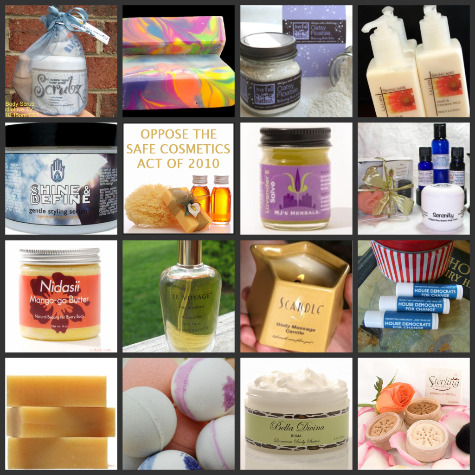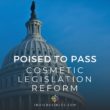Last week, I shared plans to return to Washington, DC on a fact-finding mission with regard to the FDA Globalization Act of 2009 (FDAG 2009). If you have not done so, please read that post for background and context. This post provides a high level overview of what I learned on that trip. (If you are a member of IBN, check your email for a more in depth report with Action Items.) Along with Lela Barker of Bella Lucce and Leigh O’Donnell, president of the Handcrafted Soapmakers Guild, I met with the head of the FDA’s Office of Cosmetics & Colors, and two of her deputies.

We also met with Congressional staffers in the House Energy & Commerce Committee, specifically staffers from the offices of Rep. Frank Pallone Jr. (D-NJ, Rep. Tammy Baldwin (D-NY), Rep. Jan Schakowsky (D-IL) and Rep. Henry Waxman (D-CA). Finally, we met with legislative advocacy personnel at the Personal Care Products Council.
During our meetings, we confirmed that the Energy & Commerce is considering, either through revision of the currently pending FDAG 2009/HR 759 or through an entirely new bill to be introduced in the future, to:
- Require that all cosmetics companies register their facilities, the products they make and the ingredients contained in those products in a federally maintained database;
- Craft, or ask FDA to craft, a specific new set of Good Manufacturing Practices (GMP) which will apply to all cosmetics companies, regardless of size; and
- Include some provisions dealing with ingredient safety.
We also confirmed that, even though FDA regulates cosmetics, neither Congress nor FDA will take any action to address the patchwork quilt of state cosmetics regulations that are being put in place at the local level.
We do not have a specific time table for circulation of a new set of draft legislation, or amendments to the pending bill, but Congressional staffers inferred that Congress will turn its attention to cosmetics laws, at the latest, when health care legislation is dealt with one way or another. Since that situation is fluid and ever-changing, we must be prepared to address these issues immediately either way.
In light of these developments, as the president of the Indie Beauty Network, along with the Handcrafted Soapmakers Guild, I am opposed to new cosmetics legislation at the federal and state levels, unless they contain appropriate exemptions for small businesses.
We are opposed to new cosmetics legislation without exemptions for small companies because it would unnecessarily infringe on the ability of small businesses to participate in the cosmetics industry on a level playing field, all the while doing nothing to protect consumers from unsafe cosmetics. While there are many nuances to this position, and it is constantly being addressed to keep up with changing developments, here are some of the specific reasons why we oppose increased cosmetics legislation, specifically at the federal level, and also at the state level.
Mandatory Facility, Product and Ingredient Registration
Since 2005, registration of cosmetics facilities with the federal government has been voluntary through FDA’s Voluntary Cosmetics Registration Program (VCRP). FDAG 2009 contains a mandatory registration requirement that not only requires registration of company name and facility contact information, but probably through application of the voluntary program which includes registration of products and ingredients, of specific cosmetics products and the ingredients they contain.
If this passes, it means that a tiny company will have to register each new product it introduces to the market, presumably before it begins to market that product. For each product, the ingredients contained in that product will also have to be registered. Finally, to comply, a product registration must be updated each time an ingredient in that product changes.
While we do not oppose registration of facilities (company name and basic contact information), requirements to register, and subsequently update registration, of products and ingredients unnecessarily burdens small businesses without any corresponding consumer benefit.
We therefore oppose product and ingredient registration requirements unless they contain an exemption for small cosmetic businesses, and look forward to working with lawmakers and policy makers to craft an exemption that is carefully tailored to protect consumers without decimating small businesses.
(You can voluntarily register with the FDA at this link. If you are a member of IBN, you can take advantage of an exclusive VCRP training seminar (scroll to 3/19/2009). Led by an FDA official, the training seminar walks you step-by-step through the voluntary cosmetics registration process.
Good Manufacturing Practices (GMP)
Currently, FDA oversees voluntary GMP Guidelines for the manufacture of cosmetics. As their name suggests, the guidelines are guides, as opposed to legal requirements.
FDAG 2009 contains a requirement that FDA promulgate a new mandatory set of cosmetics GMP. In our meetings last week, we urged Congress to structure any new law so that FDA has the flexibility to impose GMP that recognizes the vast differences between the way large cosmetics companies make cosmetics and the way small companies make cosmetics. Our position is that there is no reason to require that a company making 1,000 bottles of lotion a month comply with the same GMP that a company making 1,000 bottles of lotion a minute must comply with.
The Congressional staffers asked us to share an approximation of how many small manufacturers are currently complying with GMP Guidelines. While they did not tell us exactly what new GMP they are contemplating, or what ingredient safety testing may be a part of any new GMP, they did tell us that some kind of GMP requirements would become mandatory.
It is our position that the nation’s smallest companies should not be required to comply with a specific set of GMP. Current cosmetics laws already require companies, regardless of size, to manufacture unadulterated products. Forcing the tiniest companies to comply with an additional set of specific procedures hampers their ability to innovate and get a relatively small number of products to market, all without any real benefit to the customers they serve.
Small companies make a small number of products, and when you balance the benefit to the public of being able to enjoy personal care products made by small and independent business owners with the extremely low risk of injury to the public based on use of a cosmetic made by a tiny company, the need to force thousands of tiny manufacturers to make their products in a particular way is obviated.
We therefore oppose the imposition of specific GMP on cosmetics companies unless there is an exemption for small cosmetic businesses, and look forward to working with lawmakers and policy makers to craft an exemption that is carefully tailored to protect consumers without decimating small businesses
Ingredients
Closely related to the issue of GMP is the issue of ingredients. In my post last week, I told you about how the Consumer Product Safety Improvement Act forced small businesses to close because it contained a pre-market testing requirement designed to curb the behavior of big businesses. Even though the requirement was aimed at large corporations, many of whom manufacture their products overseas (as do many big cosmetics companies), since there was no exemption for small companies, little businesses were forced to close their doors.
A similar undesirable result can be avoided here simply by making sure that any testing requirements be imposed on the manufacturers of ingredients used in cosmetics, and not on the manufacturers of the cosmetics. In this way, small companies can substantiate the safety of ingredient they use without being unfairly burdened with testing requirements that would put them out of business in the same way CPSIA forced companies out of business. This would make the information easily available to the public without unnecessarily burdening small businesses.
A requirement such as this would protect consumers the public the information it While FDAG 2009 does not contain specific ingredient requirements, nor does it require the testing of ingredients in products before they can be sold, it is possible that new cosmetics legislation will address this issue in ways that are similar to the Consumer Product Safety Improvement Act of 2008 (CPSIA). CPSIA has already put many small companies out of business because they cannot afford to test their products to ensure that specific ingredient levels are met.
The ingredients at issue where cosmetics are concerned are ingredients that small companies don’t even use. To force small companies to participate in testing, especially where they don’t even use the ingredients that cause concern, is unnecessary and unfair. Moreover, it is not required to protect the public interest.
Any new cosmetics laws requiring pre-market testing of ingredients, where those ingredients are not used by small companies, should not be imposed on small companies. To require otherwise serves only to burden small business owners with no corresponding public benefit.
Thus, we oppose new cosmetics legislation imposing testing of ingredients where those ingredients are not used by small businesses, and look forward to working with lawmakers and policy makers to craft an exemption that is carefully tailored to protect consumers without decimating small businesses.
State Laws
While an in-depth discussion of state cosmetics laws is beyond the scope of this post, we shared with FDA and Congressional staffers our concern that states are passing different cosmetics laws, thereby creating a sort of “patchwork quilt” of red tape for small businesses. I am hoping that we can form task forces to monitor specific state legislation (and perhaps oppose it), but that is for another day. For now, it is important that you investigate the laws in the states where you make and/or sell cosmetics to make sure you are complying with those laws. If you are a member of IBN, you can take advantage of our Business Resource Center which contains links to state laws, including cosmetics ones where applicable. (Use your member username and password to access that information.)
Helpful Links and Ideas
This is a very fluid situation. Congressional staffers are preparing new legislation, but we don’t know when it will be introduced, nor do we know exactly what it will say. Our only guideline with regard to the timing seems to be based on finalization of the health care debate. That could be as soon as next week, or as late as the end of next year. While we do not know the timing for sure, everyone we spoke with was very engaged and on top of the issues. It therefore seems clear that a new draft of cosmetics legislation will be circulated at some point, and we want to be ready to address it when we see it.
While we await next developments, it is more important than ever for small cosmetics companies to comply as best as possible with current FDA laws and guidelines. Here are helpful links and ideas:
Registration: Become familiar with the current FDA Voluntary Cosmetic Registration Program and register your facility. In addition to the FDA's website, if you are an IBN member, you can follow the FDA's presentation of how the program works through our members only website. (Scroll to the 3/19/2009 audio presentation and link.)
Good Manufacturing Practice Guidelines: Become familiar with the guidelines and comply with the ones you can comply with, or implement alternative procedures that make sense for your small operation but which further the goals of the guidelines to produce unadulterated cosmetics.
Labeling: Make sure you know how to properly label your cosmetic products using the FDA's Cosmetic Labeling Manual. Where you are not sure about an what to call a specific ingredient, consult with your supplier to obtain the proper ingredient name to be used on the product label. Be sure to remove all labeling information that makes drug-like claims on a cosmetics product. If you need additional help, check out “Soap & Cosmetic Labeling Book” by Marie Gale.
State Laws: Check your own state to see if there are any laws applying to cosmetics and do your best to comply with them.
Obtain Products Liability Insurance: In addition to complying with state and federal requirements (laws), and doing your best to comply with guidelines that help give you confidence that your products are being manufactured in a safe and clean environment, if you are selling products to the public, procure products liability insurance so you are covered if any problems do occur. IBN's products liablity insurance program through Stratus Insurance Services is a good place to start. If you gross less than $5,000 a year in cosmetics sales, check with RLI Corporation, a nationwide insurance company that may be able to provide coverage for you.
I will continue working with the Handcrafted Soapmakers Guild to prepare industry questionnaires so we can get a handle on the current state of the small scale cosmetics industry.
Summary
The information we have at this time is consistent with what is stated here. I will keep you updated on information as it becomes available. In the meantime, remember that our main concern is that our customers continue to be able to enjoy the safe cosmetics that small businesses make on a very small scale. The main concern is with the potentially broad application of laws to tiny businesses where there have been no problems with the cosmetics they make, nor is there a foreseeable risk that there will be. The likelihood that any problem will be caused by tiny businesses is so low that the burdens associated with proposed laws, without exemptions for little companies, outweigh any benefits.
I am excited to continue to work with Congressional lawmakers and policymakers, and also with FDA and state regulators to create laws that further the public interest without unnecessarily decimating the small businesses that make this nation great.
You can read the Handcrafted Soapmakers Guild's post about our visits at this link.
Question: What do you think? Do you plan to oppose new cosmetics laws unless there are exemptions for small businesses? Why or why not?



